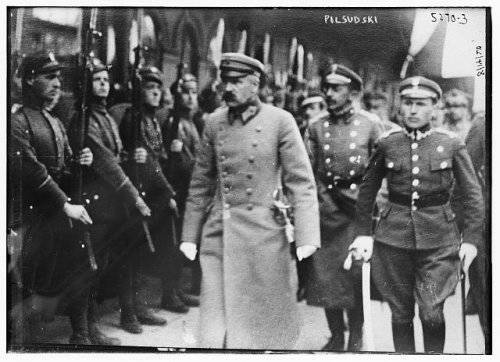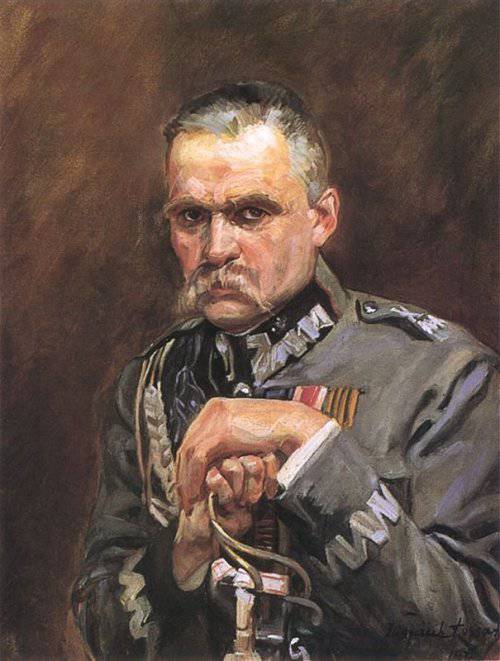Poles celebrate the anniversary of the “miracle of the Vistula”
Since there are not so many solemn dates in the Polish asset - more and more anniversaries of sections, shootings and other national disasters, this anniversary is celebrated with a special pomp. A special solemnity is betrayed to the moment by his frankly Russophobic character - still, after all, the victory was won over the “sunny Moskals”! What is characteristic is that the past 65 anniversary of the liberation of Warsaw (as well as Krakow, Gdansk, Cognition and other cities) last year from the German occupiers, for which hundreds of thousands of the same “Moskals” laid down their heads, were completely overlooked in Poland.
Despite the commitments made according to the Riga world not to support armed anti-government activities in the adjacent territories, the Poles in 1921-1924. helped detachments of supporters of Savinkov, Petlyura, and Bulak-Balakhovich to conduct military operations against Soviet power. For its part, the Red Army Intelligence Directorate until 1925 supported the partisan activity in the Western Belarus detachments of Orlovsky, Vaupshasov and others.
But with the notorious “miracle on the Vistula” of 1920, the Poles not only rush about as a well-known character with a written bag, but in every possible way also emphasize it “worldwidehistorical value".
“The battle was of great importance for Poland because it preserved the independence of our country. If Poland had lost, then all the misfortunes that would later befall the Soviet Ukraine, Belarus — the red terror, the Cheka, collectivization, the famine, would have fallen upon it. The Polish army then set an insurmountable barrier to the expansion of communism. If communism passed through Poland then, it would have great chances to spread to the whole of Europe, ”says Polish historian, Professor Tomash Nalench, quoted by Radio Liberty.
An even more apocalyptic picture of Pan Nalecz is described in the article “If the Soviets had won ...” (Tygodnik Powszechny, Poland). Whoever wants to laugh can read the whole article on the Voice of Russia. In a nutshell, let us say - according to Nalench, if not for Polish prowess, the hordes of bloody Bolsheviks already in the 1920 year would come to the English Channel and the Strait of Gibraltar. So the goose saved Rome, that is, Poland - the European democratic civilization.
It is worth remembering that, in spite of all the "misfortunes" that, according to Nalench, "Moscow Bolshevism" bears, he himself spent most of his life in the Communist-led Polish People's Republic. Moreover, despite the “red terror, the Cheka, collectivization, the famine,” it did not live in the underground or concentration camp, but as a successful party member, university lecturer with a professor’s degree, and a regular author of the Soviet publishing house Political Literature.
It was necessary to read the book “Daria and Tomash Nalech. Jozef Pilsudski. Legends and facts. - M., 1990 ". There, the pan (or, then still “comrade”) Nalench and his Lady Darya very convincingly expose Pilsudski’s current national hero in adventurism, betrayal of Marxism, clinical Russophobia and dictatorial aspirations.
Polish sufferings about the fate of Ukraine and Belarus are even more touching. The regime that the Poles established in the territories of these lands that had departed in the Riga Peace (1921) was even described by the Russophobic Rukhovtsy and Beenefovites as ethnocide.
In fact, if we recall the victory over the "red" in August 1920, why not remember that the war itself began with the Polish invasion of Ukraine and Belarus.
The Poles are still not ashamed to admit that, just in 1918, the restoration of Poland’s independence was proclaimed, they immediately demanded "the historical boundaries of 1772 of the year." Simply put - the Western Dvina and the Dnieper, as well as the Baltic and Black “mozha” should have become the eastern border of Poland.
Such Polish appetites shocked even the Entente Supreme Council patronizing her, and Lord Curzon (as KM.RU had already repeatedly told) to moderate their appetites, and limit themselves to the ethnographic boundaries of the purely Polish population. Hence the famous “Curzon Line”, along which today, for the most part, passes the border of Poland with Ukraine and Belarus.
It is curious, however, that although, like everyone, Lord Curzon was not a member of the Politburo or the Council of People's Commissars, for this line in Poland they were offended precisely by Moscow. However, Ukrainian nationalists, oddly enough, too, are offended by it - they say, it was necessary to chop off more “historical Ukrainian lands” from Poland. But, again, claims to the wrong address - complain to the British lord.
In contrast to the modern Polish (and Ukrainian) “patriots,” who are basically capable only of the vicious yelping, mentioned above, Yuzef Pilsudski, we give him his due, turned out to be a much more decisive guy. He resolutely did not care for the Supreme Council of the Entente and the Lord with his line, and he himself decided to correct the line of state borders. In accordance with their own understanding of their justice.
Back in 1919, his troops occupied almost all of Belarus, defeated the Western Ukrainian republic in Galicia, even entered Latvia and Lithuania. In Russia, the “red” and “white” confrontation was in full swing, and those and others could react to Polish actions only with protest notes - which no one in Warsaw read, because neither Poland nor the “white” government of Poland recognized.
However, Pilsudski believed that the victory of the “Reds” was preferable for Poland - and in fact helped them defeat the army of General Denikin. The latter, as Pilsudski understood perfectly, does not recognize Polish territorial seizures. And the Bolsheviks - after all, "the proletarians have no boundaries," may well go for it. And indeed, at the beginning of the 1920, the Bolsheviks offered the world to Poland, in effect giving way to Belarus. But this seemed little to Pilsudski, and in May 1920 his troops swiftly took Kiev.
It was here that the Bolsheviks took it more seriously - although they were still engaged in fierce battles with Wrangel, their large forces were diverted in Siberia and Turkestan, and the anti-Bolshevik insurgent movement was going on throughout Russia. The country was in complete economic collapse. And the imperfection of the “war communism” system was recognized even by its founder, Lev Davidovich Trotsky. Nevertheless, by transferring troops from Siberia and the North Caucasus, tested in battles with the armies of Kolchak and Denikin, the red command managed to somewhat strengthen the rather weak forces of the South-Western and Western fronts.
It must be said that, in contrast to the units that were thrown from the south and east, the troops of the Western Front were Bolsheviks below all criticism. They consisted mainly of the former so-called "veil troops", that is, those who simply had nowhere to go after the collapse of the old army, or who wanted to find there at least a feeding and clothing. Unlike the troops of the Southern and Eastern Fronts, they almost did not participate in hostilities. The arrival of such units as the 1-I cavalry army, the 3-th cavalry corps of Guy, the 27-I Red Banner Omsk division, and a number of others, changed the situation on the Polish front. For example, only the troops of the Western Front (whose command was entrusted to Mikhail Tukhachevsky) and only in June 1920 of the year received more than 58 thou. During the preparation of a decisive offensive in Belarus, 8 rifle divisions, 4 rifle brigades, 1 cavalry brigade and squadron arrived at the front. The troops of the South-Western Front of Alexander Yegorov were also significantly replenished. As a result, in the course of fierce fighting in June-July 1920, Polish troops were defeated in Belarus and Ukraine, and the Red armies launched a counteroffensive.
It was then that both the Revolutionary Military Council (led by Trotsky) and the command of the fronts put forward these loud slogans “Forward, to Warsaw! Go to Berlin! Long live the world revolution! ”, Who so love to remember to this day. Although, of course, it was a complete adventurism - what a march on Berlin, if the Red Army for almost a year could not cope with one of the Wrangel Crimea.
About the numerous mistakes of the red command, and Tukhachevsky, and the commander-in-chief, Sergey Kamenev, and about the uncoordinated actions of Yegorov, who commanded the South-Western Front (to which Stalin, who was a member of the Revolutionary Military Council there, is usually accepted), was written a lot. The adventurism of the actions of Tukhachevsky, who stretched out communications, scattered troops and lost control of them, was recognized even by his apologists. And what about such an “innovation” of Tukhachevsky, as a complete abandonment of reserves: all that is — we must immediately be thrown into battle, he believed. We will not deny both resilience and patriotic upliftment shown by the Poles when the enemy was at the gates of their capital (despite for the whole adventurism of their political leadership).
Taking into account all these factors, the “miracle on the Vistula” turned out to be quite natural. When the Poles in the Vepzh area of 16 August launched a counterattack, they almost fivefold exceeded the opposing group of Soviet forces in the direction of the main attack. And although the overall number of troops on both sides was about equal, most of the red units managed to advance so deeply on the right flank of the offensive that, after breaking through in the center, by August 17 – 18 they were completely surrounded, hundreds of miles away from their rear lines . With huge losses to 25 in August, the remnants of the 15, 3 and 16 of the Soviet armies broke into the areas of Bialystok and east of Brest-Litovsk. But the 4 Army with the 3 Horse Corps and two divisions of the Army 15 could not get through, and were forced to go on internment to East Prussia.
Actually, after this battle, the result of the war was almost predetermined. And although, on the one hand, there were still statements about a new rush to the world revolution, but on the other, about borders from “mozh” to “mozha”, at the top in Moscow and in Warsaw, they understood that this was already utopia. In October, the 1920 of the year in Riga, the parties quickly agreed to an armistice, defining the boundaries of the roughly established front line by that time. In March 1921, these boundaries were approved by the Riga World.
The Poles, at the same time, “threw” the Ukrainian independence of Petliura (recognized by them as the legitimate government of Ukraine), agreeing with the Soviet side not to allow them to negotiate. However, the Bolsheviks provided reciprocal courtesy, when, referring to the resolution of the Supreme Council of the Entente on autonomy for Eastern Galicia, representatives of the defeated West Ukrainian People's Republic tried to get through to negotiations in Riga. The Poles refused to let them even on the threshold, in which the Soviet representatives were completely in solidarity with them.


Information